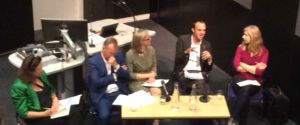This post was contributed by Guy Collender, Communications Manager, Birkbeck’s Department of External Relations.
The phenomenal swimming achievements of Adrian Moorhouse MBE speak for themselves: world number one from 1986 to 1992 for 100m breaststroke, Olympic gold medal winner in 1988, and serial breaker of world records. He has also been incredibly successful in business. The management consultancy he co-founded, called Lane4, boasts 80 staff, works in 30 countries and has been recognised repeatedly by The Sunday Times as one of the best 100 small companies to work for. How did he manage to transfer his success from the pool to the boardroom? That intriguing question was the subject of the Alec Rodger Memorial Lecture, entitled What can business learn from sport?, which Moorhouse delivered on 24 June during Birkbeck’s Business Week.
Moorhouse emphasised the importance of applying sporting practices and insights from organisational psychology to create conditions for success. He explained how this was the philosophy of the University of California, where he trained after winning a sports scholarship at age 18. Often referring to the success of Team GB at the 2012 Olympics, he described how the athletes were assisted throughout in a way that is rarely the case for businesses. This approach helped Team GB to third position in the medal table. He said it is necessary to identify “critical performance moments” and then give people what they need when they need it. He also stressed practising under pressure, learning from failure and setting goals as part of talent development.
Moorhouse continued by focusing on goals, saying: “Sport motivates people well with goals. People [in business] don’t work hard enough on meaning.” He employed a goal framework to show how to divide the ultimate goal into manageable stepping stones en route to the overall prize, and how he had to meet a mind-boggling 400 key performance indicators on his way to winning gold in Seoul during his four-year Olympic campaign.
Building mutual trust within teams was highlighted as an essential component of success. He explained how leaders have to believe in people and work together on goals, and how individuals need to be “team-fit”. He said: “My goal is to create an environment where people can be brilliant. My job is to release their talent.”
Aside from the role of the team, Moorhouse did refer to the personal resilience, self-esteem, self-belief, discipline and rigour required to succeed. He shared a headline from The Daily Telegraph, which declared “Moorhouse is a failure”, after he came fourth in the 1984 100m breaststroke final. At the next Olympics he was to prove the journalist wrong when he won gold.
Moorhouse did explain that not all sporting skills and approaches can be transferred to the world of business, but it is clear that his sporting background and “entrepreneurial nature” are enabling him to succeed.

